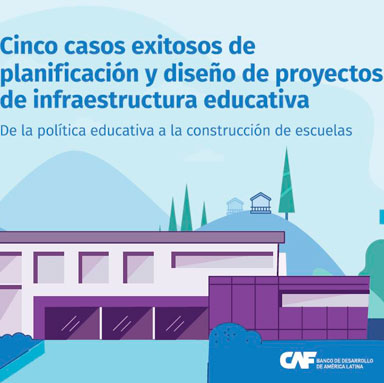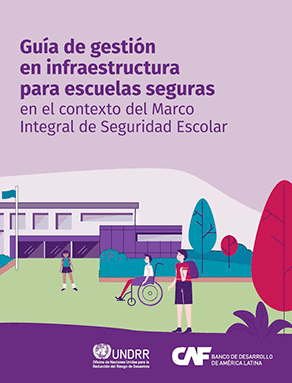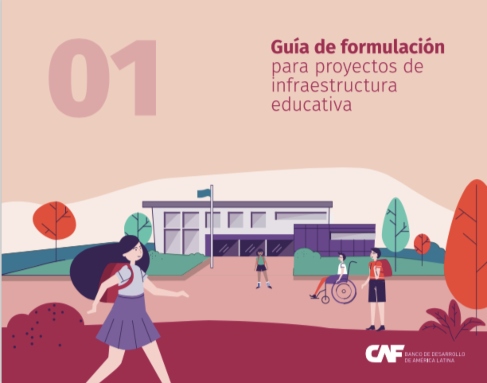
Innovation workshop on resilient and transformative educational infrastructure for learning in Latin America and the Caribbean
November 05 to 06, 2024
Bogotá, Colombia
CAF - Development Bank of Latin America and the Caribbean - organizes the Innovation Workshop on resilient and transformative educational infrastructure for learning in Latin America and the Caribbean whose objective is to promote instances of exchange, dissemination, and design of strategies for architectural innovation and urban development of learning infrastructure executed by our member countries
Although there is a consensus on education as a key to progress, equality, and sustainable development, the region faces considerable challenges in educational infrastructure and its ability to adapt to 21st-century scenarios.
The regional deficit in social and economic infrastructure is marked by a gap that has widened, especially in the education sector. Although, over the last 15 years, the countries of the region have increased investments in education, aligning with the commitment to achieve and guarantee inclusive, equitable, and quality education of Sustainable Development Goal 4 by 2030, inequality persists as a distinctive feature, with the region of Central and South America being the most in need in this context.
The provision and improvement of educational infrastructure emerge as a crucial factor in this panorama. From the lack of classrooms to the lack of access to modern technologies, several factors directly impact educational quality. Studies highlight the influence of the physical quality of infrastructure on the academic performance, health, and safety of students. The gap between rural and urban schools is evident, especially affecting students from disadvantaged sectors. To address these shortcomings, it is crucial to consider inclusion, safety, and flexibility in the design of educational spaces.
This workshop will have the following specific objectives:
- Strengthen relationships and exchange between areas of educational infrastructure in the region with which CAF works.
- Exchange innovative experiences developed in the region
- Analyze main innovations implemented for the design and implementation of educational infrastructure projects.
- Detect achievements and obstacles that arise from practice.
- Define possible improvement strategies or actions to be implemented later.
The following work priorities are proposed:
- Articulation and networking with organizations and institutions.
- Strengthening political and technical capacities.
- Generation of knowledge and strengthening of capacities among peers.
The signing of an agreement for sustained action in the innovation of resilient and transformative educational infrastructure is proposed as the final product of the workshop.
The event will have participants from the Ministries of Education of our member countries.
How do we work to transform the educational reality in our region?
At CAF -Development Bank of Latin America and the Caribbean-, we provide technical and financial assistance for initiatives that expand access to education, improve quality, and strengthen the relevance of educational offers. To transform the educational reality in our region, we advocate action strategies in four fundamental axes:
1. Infrastructure as a place of inclusion: Let's imagine educational spaces as a third teacher (the first the learning community, the second the traditionally recognized teachers), a living space that educates and shapes learning. Promoting this vision involves designing environments that reflect respect for diversity and gender equality.
2. Articulation of the infrastructure with its environment: We encourage the connection of educational spaces with the surrounding community to enrich the exchange of knowledge and strengthen the ties between the school and the community. This synergy benefits students and strengthens the relationship between school and community, creating a richer and more collaborative educational ecosystem. At this point, promoting participatory processes of design and execution of infrastructures adapted to local realities is of interest.
3. Transition and flexibility of learning spaces: We recognize that learning is not limited to four static walls; Flexibility is needed to adapt to different pedagogical methods and ways of learning. Educational infrastructure must allow fluid transitions between spaces, encouraging collaboration and creativity. Versatile classrooms and outdoor learning areas offer opportunities to explore, experiment, and learn dynamically.
4. Eco-efficiency and environmental sustainability: We promote ecologically friendly interventions that reflect the importance of respect for the environment and the conservation of our resources. The use of efficient materials, the reduction of emissions, and the use of nature-based solutions and blue and green infrastructure are elements to consider when designing infrastructures for learning.
Why is it important to reflect on the importance of innovation in resilient educational infrastructure in Latin America?
We believe that putting educational infrastructure at the center of the debate on quality improvement motivates us to understand schools as epicenters of dynamic knowledge, strengthened by a framework of equality, in which each student builds a path with his or her educational community to obtain opportunities for development and progress. In the direction of this scenario, we must promote innovative practices to transform the educational infrastructures of Latin America and the Caribbean into places that reflect the desires of the men and women that our region requires to be more egalitarian and fair in the social and environmental.
Download our publications
Documento
Guía
Guía
Agenda
Tuesday, November 5, 2024
8:30- 9:00 | Reception
9:00- 9:15 | Opening and Welcome
- Vice Minister of Preschool, Basic and Secondary Education of the Republic of Colombia
9:15-9:30 | Introduction to work in collaborative sessions
Pablo Bartol. CAF Social and Human Development Manager
9:30- 9:50 | CAF perspective on innovation in infrastructure for learning
- Martin Motta. CAF Senior Executive of Social Infrastructure
9:50-10:50 | Project spaces for learning Presentation and exchange space
- Giancarlo Mazzanti. Director of Architects
10:50-11:00 | Coffee break
11:00-12:00 | Innovation in infrastructure for learning Presentation and exchange space
- Rosan Bosch. Founder and Creative Director of Rosan Bosch Studio
12:00-13:00 | Collaborative Session “Towards innovation in educational infrastructure in Latin America and the Caribbean” (Part 1)
- Moderator: Jorge Raedó
- Country Representatives
13:30-15:00 | Lunch
15:00-17:00 | Collaborative Session “Towards innovation in educational infrastructure in Latin America and the Caribbean” (Part 2)
- Moderator: Jorge Raedó
Country Representatives
17:00-17:30 | Reflections on the results Collaborative Session Part 1 and 2
Moderator: Jorge Raedó
All participants
Tuesday, November 5, 2024
8:30- 9:00 | Reception
9:00- 9:15 | Opening and Welcome
- Vice Minister of Preschool, Basic and Secondary Education of the Republic of Colombia
9:15-9:30 | Introduction to work in collaborative sessions
- Pablo Bartol. CAF Social and Human Development Manager
9:30- 9:50 | CAF perspective on innovation in infrastructure for learning
- Martin Motta. CAF Principal Executive of Social Infrastructure
9:50-10:50 | Project spaces for learning Presentation and exchange space
- Giancarlo Mazzanti. Director of Architects
10:50-11:00 | Coffee break
11:00-12:00 | Innovation in infrastructure for learning Presentation and exchange space
- Rosan Bosch. Founder and Creative Director of Rosan Bosch Studio
12:00-13:00 | Collaborative Session “Towards innovation in educational infrastructure in Latin America and the Caribbean” (Part 1)
- Moderator: Jorge Raedó
Country Representatives
13:30-15:00 | Lunch
15:00-17:00 | Collaborative Session “Towards innovation in educational infrastructure in Latin America and the Caribbean” (Part 2)
- Moderator: Jorge Raedó
- Country Representatives
17:00-17:30 | Reflections on the results Collaborative Session Part 1 and 2
- Moderator: Jorge Raedó
All participants



